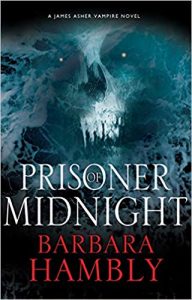Liz Bourke Reviews Prisoner of Midnight by Barbara Hambly
 Prisoner of Midnight, Barbara Hambly (Severn House 978-0-7278-8860-0, £21.95, 256pp, hc) January 2019.
Prisoner of Midnight, Barbara Hambly (Severn House 978-0-7278-8860-0, £21.95, 256pp, hc) January 2019.
Barbara Hambly has been writing excellent novels for over 30 years. Alas, in the last decade her new work has been rather less than widely available. Severn House Press, an outfit that specialises in hardcover crime and mystery novels, publishes both her Benjamin January novels and her James Asher vampire series, but hasn’t made them available in paperback. It is a damnable shame, because the James Asher novels comprise quite possibly the most atmospheric vampire series I’ve ever read, with the most plausible and horrifying human monsters.
Prisoner of Midnight is the latest instalment in that series. While the books might officially be known as the James Asher series, they’re effectively the James-and-Lydia Asher series, because since the third, they’ve given equal weight to James’s doctor wife, Lydia. The two of them have a (non-sexual, we shall specify) relationship with the vampire Don Simon Ysidro that’s complicated by history, gratitude, and the nature of monsters. Prisoner of Midnight is really Lydia’s book.
It’s 1917. The Great War is in full murderous spate when Lydia learns that someone has managed to drug and enslave a vampire, in order to have a terribly potent weapon at their service. Don Simon Ysidro is imprisoned somewhere aboard the SS City of Gold, a luxury liner on its way to America. James and Lydia have long feared that a government would secure the services of vampires as a weapon in the great game. A private citizen able to command vampires to do his bidding might prove just as bad, if not worse.
Lydia secures passage aboard the City of Gold through the offices of her aunt – who manipulates events to force Lydia to take her young daughter Miranda with her, too – and sets out to investigate the first class passengers while trying very hard not to think of the risks posed by German submarines to civilian shipping. Meanwhile, in Paris, James is forced into perilous association with the Paris vampire nest to try to find out what drugs were used to capture Don Simon before the City of Gold travels out of radio range.
Lydia’s mission is not one of rescue. She likes Don Simon, but she knows that he’s a monster. She doesn’t believe she can permit a vampire, even one that’s not leashed as someone else’s weapon, to have free run of the Americas. When she finds Don Simon, she may find herself forced to kill him.
While Lydia negotiates the politics and dangers of first class, she also becomes embroiled in difficulties further down the social scale. There have been murders in third class, and several travellers who originally come from Eastern Europe claim that the deaths can be laid at a vampire’s feet. Lydia must investigate, because if there are two vampires aboard, the danger is twice as great. She finds allies – in third class, in the form of a Marxist fleeing the authorities back home who doesn’t believe in superstition but who nevertheless is dedicated to uncovering the truth; in first class, in the form of a Russian aristocrat and her spiritualist advisors – but Lydia herself is the only one who understands the depth of their danger, and what will happen if the man who has enslaved Don Simon has his way.
Hambly’s work is always compelling and atmospheric, with subtle and nuanced characterisation. Her historical works have always kept themselves very firmly in touch with the time and place of their setting. In this, Prisoner of Midnight is no different. Yet it feels like a capstone to the series. It ends with many things – and people – having changed from what they were, and with Lydia and her daughter no longer based in England. Personally, I hope it’s not the end. If it is, it’s a deeply satisfying way to go.
Liz Bourke is a cranky queer person who reads books. She holds a Ph.D in Classics from Trinity College, Dublin. Her first book, Sleeping With Monsters, a collection of reviews and criticism, is out now from Aqueduct Press. Find her at her blog, her Patreon, or Twitter. She supports the work of the Irish Refugee Council and the Abortion Rights Campaign.
This review and more like it in the April 2019 issue of Locus.
 While you are here, please take a moment to support Locus with a one-time or recurring donation. We rely on reader donations to keep the magazine and site going, and would like to keep the site paywall free, but WE NEED YOUR FINANCIAL SUPPORT to continue quality coverage of the science fiction and fantasy field.
While you are here, please take a moment to support Locus with a one-time or recurring donation. We rely on reader donations to keep the magazine and site going, and would like to keep the site paywall free, but WE NEED YOUR FINANCIAL SUPPORT to continue quality coverage of the science fiction and fantasy field.








